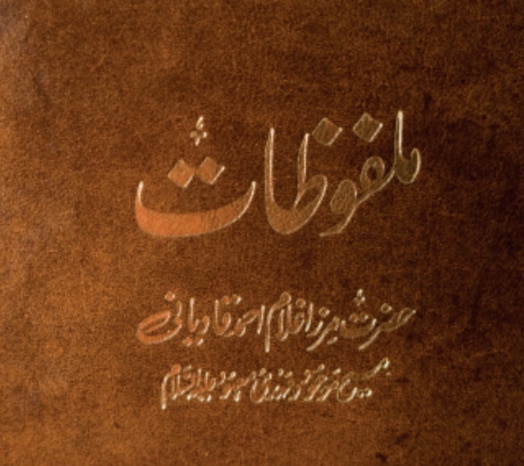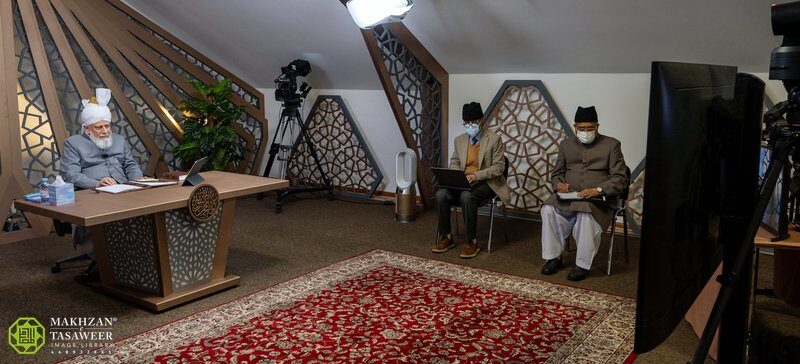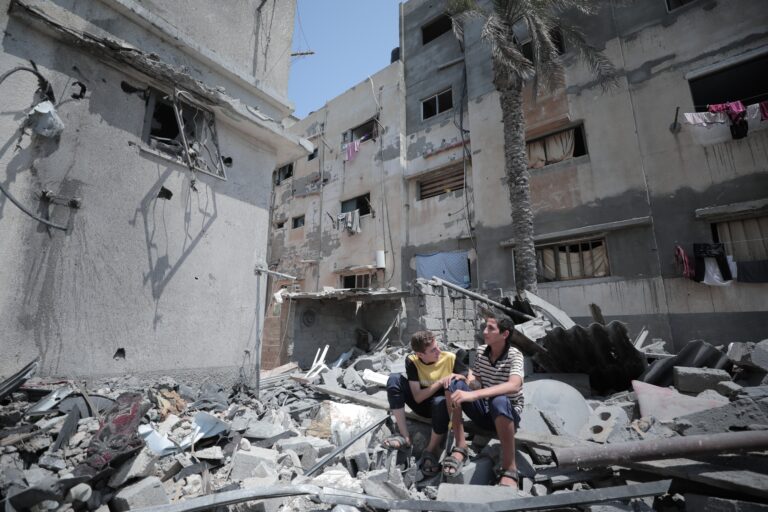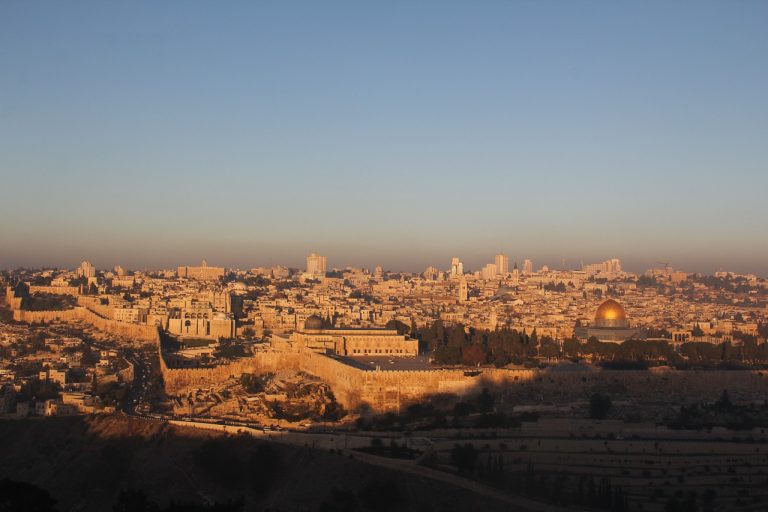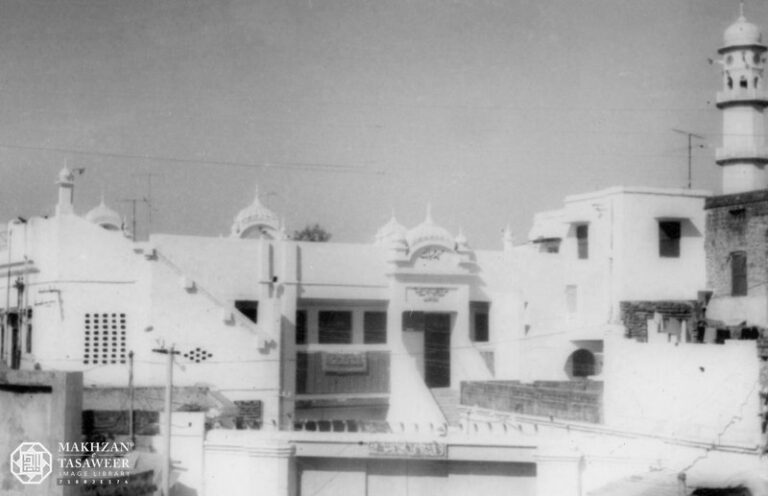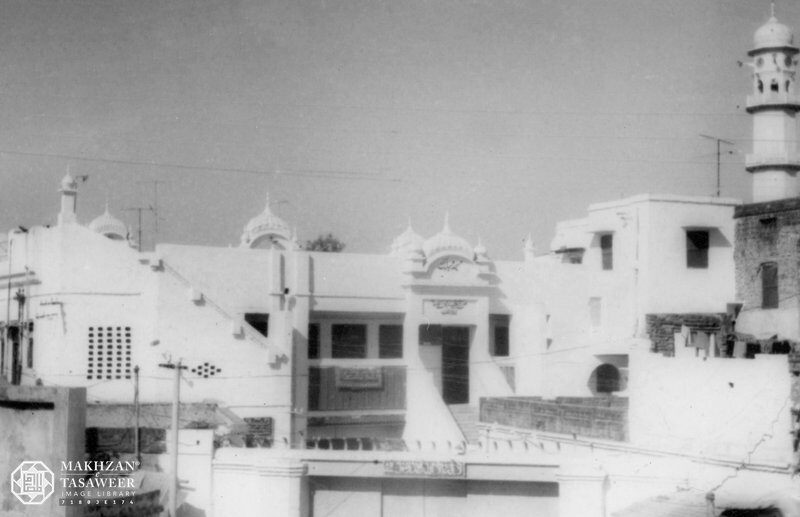On 22 October 2023, the amila of Majlis Khuddam-ul-Ahmadiyya France was blessed with the opportunity to meet Hazrat Amirul Momineen, Khalifatul Masih V, may Allah be his Helper, in a virtual mulaqat.
After conveying salaam, Huzooraa enquired whether this was the amila, to which Jameel Ur Rehman Sahib, Sadr Majlis Khuddam-ul-Ahmadiyya France, affirmed. Following this, Huzooraa led everyone in silent prayer, and then the members had the opportunity to introduce themselves.
Shakeel Ahmad Sahib, serving as Motamid Majlis Khuddam-ul-Ahmadiyya, was the first to present his report. Huzooraa asked him about his profession, to which he replied that he is a chartered accountant.
Huzooraa asked him about the number of majalis in France and how many of them submit regular monthly reports. He reported that there are 13 majalis in France, and 10 of them submit reports monthly. He also mentioned that out of 596 members, 429 are khuddam, and the remaining are atfal.
Usama Ahmad Sahib, who serves as Muavin Sadr in the departments of Maal and Ishaat had the opportunity to present his report. Following him, Muhammad Abdullah Sahib, serving as the acting Mohtamim Amoomi, reported that he resides in Paris, close to Masjid Mubarak, and mentioned that regular duties are carried out on Fridays, during ijtemas, and various other events.
Bilal Akbar Sahib, Naib Sadr Daum, reported that he is assigned to oversee four departments: Talim, Tarbiyat, Sehat-e-Jismani, and Rishta Nata. Then, Sebastian Ataul Haye Sahib reported that he is serving as Naib Sadr Awwal. He added that he oversees the departments of Umur-e-Tulaba, Khidmat-e-Khalq, and Nau-Mubai‘een.
Next to report was Aneel Anas Sahib, Mohtamim Tarbiyat. Huzooraa enquired if he was born in France and about his field, to which he affirmed and mentioned that he works in the IT field. Regarding tarbiyat, he reported that efforts are being made to encourage khuddam to listen to Huzoor’saa addresses and sermons, observe salat at the centre, and foster stronger bonds with khuddam. Huzooraa said, “The Sadr and the amila should visit every khadim’s house and greet them with salaam,” and added that each khadim should be contacted at least twice a year.
Furthermore, Aneel Anas Sahib reported how many of the khuddam offer their daily salat. Upon hearing the low number, Huzooraa explained that he had recently stated, in light of the writings of the Promised Messiahas, “A religion devoid of worship is not truly a religion.” Huzooraa added that more attention should be given to offering salat, reciting the Holy Quran, and reflecting upon it.
In light of materialism being widespread in France, creating an anti-Muslim atmosphere, Huzooraa said that if they, Khuddam-ul-Ahmadiyya France, also forget the Holy Quran, Islamic teachings, offering prayers, and fail to bow before Allah, then they could not be referred to as Khuddam-ul-Ahmadiyya but rather “Khuddam-ul-France”.
Talha Ayyub Sahib, Mohtamim Sehat-e-Jismani, while reporting, shared that he himself has a fondness for playing cricket and occasionally football. Huzooraa enquired if they play cricket in France, to which Talha Ayyub Sahib affirmed and mentioned that there is also a cricket club in France. Huzooraa further asked if he had come to the UK for a tournament, to which he also replied affirmatively. He reported that 30% of the khuddam regularly engage in sports.
Ahmad Touseef Qamar Sahib, serving in the Rishta Nata Department, reported that after collecting the relevant particulars, they send them to the Markaz. He also mentioned that the particulars of 133 khuddam had already been forwarded.
Junaid Doobory Sahib reported that he oversees the departments of Umur-e-Tulaba and Khidmat-e-Khalq. He mentioned that there are currently 69 khuddam attending university out of a total of 105 students. When Huzooraa asked if there is an AMSA (Ahmadiyya Muslim Student Association) established at the university, Junaid Sahib replied that due to khuddam being scattered across different universities with only one or two khuddam in each, they had not established one. Huzooraa said that AMSA could be established at the national level.
Adil Ahmad Sahib reported that he is serving as the Muhasib. In response, Huzooraa asked whether he verifies the receipts and emphasised that every receipt should be thoroughly checked.
Bilal Rabani Sahib, who serves as Mohtamim Atfal, was next to report. Upon hearing that he used the word “khidmat,” which means “to serve,” Huzooraa commented that it is commendable, and one should always consider themselves in a service role. “You should consider yourself a khadim [one who serves].”
He reported that there are 167 atfal in France, and he added that all of them are actively participating. Regarding their tarbiyat, he mentioned that more than 200 educational classes were conducted, along with Waqar-e-Amal activities and picnics throughout the year.
Imtiaz Asad Wasim Sahib, serving as Mohtamim Maal, was the next to report. Huzooraa enquired about his professional career, to which he replied that he works as an accountant. After presenting budgetary details, Huzooraa advised them to inform khuddam about why chanda (donations) is collected and how it is utilised. Following that, Yusuf Ahmad Sahib reported that he serves as Mohtamim Tehrik-e-Jadid. He mentioned that out of 429 khuddam, 163 participated, and among the 167 atfal, 50 took part.
Ali Ishu Sahib, serving as Mohtamim Tabligh, reported that they have formulated plans to distribute pamphlets, are in the process of developing a national-level syllabus for tabligh, and are actively working on visiting all majalis to engage khuddam and raise awareness about tabligh.
Huzooraa emphasised the need to have certain individuals to invite others towards Islam through tabligh and commit their time to this noble cause. Huzooraa also noted that there is a considerable amount of misinformation about Islam in France and suggested the establishment of information stalls to educate people about Islam as a religion of peace. He further mentioned that these stalls could inform people about the Holy Prophet’ssa advocacy for peace, the teachings of the Holy Quran, and the purpose of the Promised Messiah’sas advent.
Aqib Javed Sahib, serving as Mohtamim Ishaat, reported that they have been publishing articles online and emphasised the importance of khuddam also contributing by writing. He mentioned that khuddam are encouraged to write at least one article per month.
Farukh Javed Sahib, Mohtamim Tajnid, reported that the tajnid for khuddam is 429. Referring to the tajnid and data collection, Huzooraa suggested that they should create their own data by going door to door for tajnid purposes.
Matlub Ahmad, serving as Mohtamim Talim, reported that the book provided to khuddam this year is Sharait-e-Bai‘at Aur Ahmadi Ki Zimadariyan [Conditions of Baiʻat & Responsibilities of an Ahmadi]. Huzooraa emphasised the importance of receiving feedback and urged that the nazimeen provide it. Next, Mansoor Ahmad Sahib, Qaid Majlis Lyon, reported that 21 khuddam reside there.
Daud Ahmad Sahib, Qaid Majlis Strasbourg, reported that there are 32 khuddam residing there. Huzooraa enquired about his profession, to which he replied that he works in the IT field. Syed Ahmad Rajput Sahib, Qaid Majlis Lille and Valenciennes reported a total of 33 khuddam in that region. Bashir Ahmad, serving as Mohtamim Waqar-e-Amal, shared that efforts are put into maintaining the cleanliness of the mosque and setting up tents for various events. Labeed Ahmad, Mohtamim Sanat-o-Tijarat, was the next to deliver his report. In conversation with him, Huzooraa enquired about his profession, to which he replied that he works as a salesman.
Irfan Ahmad Sahib, Mohtamim Tarbiyat Nau-Mubai‘een, reported that whenever an opportunity arises, a gathering is organised within the mosque for the Nau-Mubai‘een. He added that, according to the most recent data, there are 17 Nau-Mubai‘een, with some coming from Algeria, Morocco, and others from other countries in Africa. Observing his health and physique, Huzooraa smiled and suggested that he should also engage in sports.
Bazil Muhammad Sahib, Qaid Majlis Darul Nur, reported a total of 16 khuddam in that region. Next, Rizwan Naseer Sahib, Qaid Majlis Toulouse, reported that there are 14 khuddam in the local area. While speaking with Muqaddas Ahmad Sahib, Qaid Majlis, Huzooraa emphasised the importance of prayer and stated that a Qaid should not only perform the five daily prayers but also offer Tahajjud and nawafil to ensure success and blessings in their work.
Next, Imtiaz Ahmad Sahib, Qaid Majlis Saint-Étienne, reported that there are 76 khuddam in their majlis, making it the second largest in size. Following him, Muhammad Faheem Sahib, Qaid Majlis Parsi region Yvelines, reported that their majlis has 27 khuddam. Huzooraa, referring to the number of people in Majlis Khuddam-ul-Ahmadiyya France, expressed that even though it is a smaller majlis, it should strive to be an exemplary one that can set a positive example.
Rafi Ahmad Faheem Sahib, Qaid Majlis Seine-et-Marne, reported a total of 23 khuddam there. While conversing with Basil Wahla Sahib, Qaid Majlis of the local Masjid Mubarak, Huzooraa asked about his place of origin and whether he had any relatives in America. Basil Wahla Sahib responded that he is from Sheikhupura, Pakistan, and added that he has relatives in Canada. He further reported that there are 106 khuddam in his region, with approximately 70% of them being active.
Next, both Tasawwur Ahmad Sahib, Qaid Majlis Eparney, and Ahmad Saeed Sahib, Qaid Majlis Goussainville, had the opportunity to present their reports and speak with Huzooraa.
Huzooraa mentioned that he had provided them with the essential information and conveyed that it was now their responsibility to work and establish an exemplary Majlis in France. Then, the amila had the opportunity to ask Huzooraa some questions.
The first question asked was related to the current situation where non-Ahmadis openly oppose the Jamaat on social media. In light of this, the questioner enquired about the steps to be taken from a security perspective.
Huzooraa responded, “If they openly oppose the Jamaat, then it is your duty to openly engage in tabligh.” He emphasised that the first and foremost step is to actively participate in this effort and promote tabligh. Regarding security, Huzooraa advised that, especially during functions and ijtemas, one should give special attention to security measures and remain vigilant.
Next, a khadim sought guidance from Huzooraa regarding Atfal-ul-Ahmadiyya’s syllabus. Huzooraa said that the syllabus can be tailored based on the children’s ages. Huzooraa also recommended providing questions that align with their age, thus being a means for their encouragement.
Referring to the hadith in which three men were trapped in a cave and prayed, recalling their righteous deeds, one of them reminded God how he would offer milk to his parents. One day, when he arrived home late and found his parents asleep, he remained standing with the milk all night, waiting to present it to them. When the khadim shared this story, Huzooraa, recognising the hadith, narrated it and mentioned that the man had prayed to God in the cave, asking that if God approved of his act done for God’s sake, please remove the rock blocking the cave entrance. Huzooraa then told him to ask his question, which was about understanding the rights of parents and children.
Huzooraa replied that the hadith mentioning the three men illustrates that they performed those good deeds for the sake of God’s love. Huzooraa emphasised that it is advised that, in all our actions, we should strive to earn God’s love. The Holy Quran provides guidance on how husbands and wives can fulfil their rights, as well as the rights of their children, and encourages prayer for their children. The Holy Prophetsa has also provided teachings on this matter.
Huzooraa added that in the hadith, it is mentioned that even if a man feeds his wife a morsel for the sake of Allah, he will be rewarded for that act. Huzooraa stressed that the love of Allah is the ultimate objective that should be pursued.
It is the responsibility of parents to take care of their children, nurture them, and set a positive example in front of them. Huzooraa then went on to emphasise the importance of salat. Huzooraa then said to fulfil the rights of Allah and the rights of fellow human beings. Huzooraa stated, “It was for this purpose that the Promised Messiahas came, and this is the goal that must be embraced and passed on to others,” encouraging us to raise our children in this manner as well.
In the end, Hazrat Amirul Momineenaa conveyed his salaam to all members, and the mulaqat came to an end.
(Report prepared by Al Hakam)

